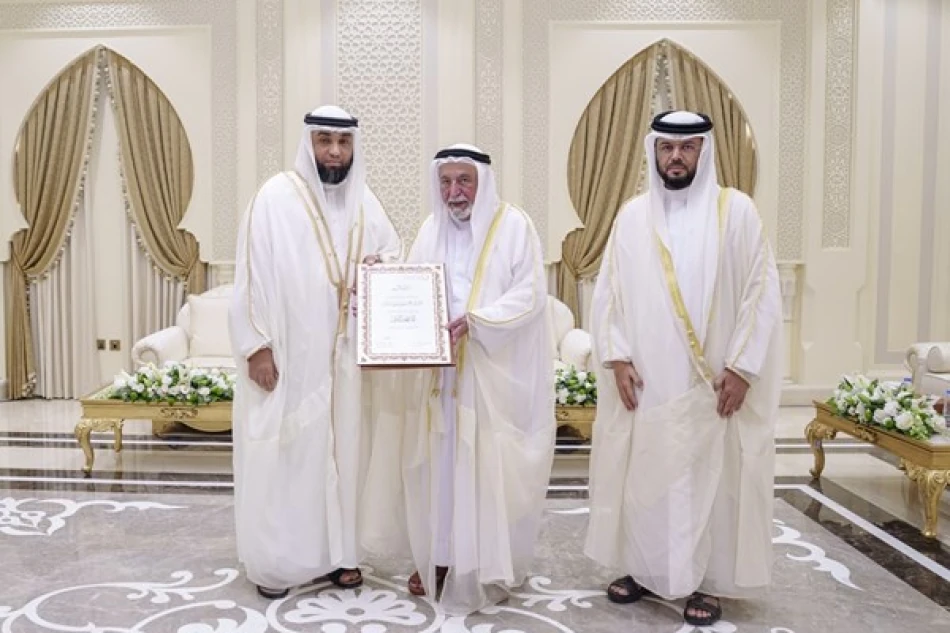
Sharjah Ruler Launches Recited Quran by Reader Raad Al-Kurdi
Sharjah Launches AI-Enhanced Quranic Recitation Project as UAE Positions Itself as Global Islamic Knowledge Hub
The Ruler of Sharjah has unveiled a new complete Quranic recitation by renowned reader Raad Al-Kurdi, marking another milestone in the UAE's ambitious strategy to establish itself as the world's leading center for Islamic scholarship and digital religious education. The initiative, launched at Sharjah's Holy Quran Academy, represents a sophisticated blend of traditional Islamic learning with cutting-edge technology, positioning the emirate at the forefront of modern religious education.
Strategic Vision Behind the Launch
Sheikh Dr. Sultan bin Muhammad Al Qasimi's launch of Al-Kurdi's recitation follows the Hafs narration from Asim, one of the most widely accepted transmission chains in Quranic recitation. The ceremony also honored reader Mahmoud Sweidan, who contributed three complete Quranic recitations using different narration styles, highlighting the project's commitment to preserving diverse Islamic traditions.
This initiative extends far beyond religious observance—it represents a calculated move to cement Sharjah's position as a global Islamic knowledge center, competing with traditional hubs like Cairo's Al-Azhar and emerging rivals in Saudi Arabia and Qatar.
Technology Meets Tradition
Digital Innovation in Religious Education
The Holy Quran Academy's integration of artificial intelligence and smart technologies sets it apart from conventional religious institutions. By creating authenticated audio references for students, scholars, and memorizers worldwide, Sharjah is building what could become the definitive digital library for Quranic studies.
This technological approach mirrors successful models in other sectors where the UAE has achieved global leadership, from aviation to financial services, suggesting a systematic strategy to apply the same innovation-driven methodology to religious education.
Global Reach and Impact
The academy's impressive statistics reveal the scope of its ambitions: nearly 2,000 certifications granted through Sharjah's Global Electronic Quran School, with over 1,000 active students from 172 countries. These numbers position the institution as potentially the world's largest digital Islamic education platform.
Regional Competition and Market Dynamics
Sharjah's initiative comes amid intensifying competition among Gulf states to lead Islamic education and cultural initiatives. Saudi Arabia's massive investments in religious tourism and education, Qatar's Islamic studies programs, and Egypt's historical Al-Azhar University all represent established players in this space.
However, the UAE's approach—combining technological innovation with traditional scholarship—offers a unique value proposition that could appeal particularly to younger, digitally-native Muslim populations worldwide.
Economic and Soft Power Implications
Beyond its religious significance, this project serves broader economic and diplomatic objectives. By establishing itself as an authority in Islamic education, Sharjah enhances the UAE's soft power across the Muslim world, potentially strengthening trade relationships and cultural ties with key markets in Asia, Africa, and beyond.
The digital nature of the platform also creates scalable revenue opportunities through educational services, app development, and digital content licensing—areas where the UAE has demonstrated considerable expertise.
Future Trajectory
The academy's emphasis on artificial intelligence suggests more sophisticated applications ahead, potentially including personalized learning algorithms, automated pronunciation correction, and multilingual educational content. Such innovations could transform how Islamic education is delivered globally, with Sharjah positioned as the primary beneficiary of this technological shift.
As Muslim populations grow worldwide and seek authentic yet accessible religious education, Sharjah's investment in this sector appears strategically timed to capture significant market share in what could become a substantial digital education economy.
Most Viewed News

 Layla Al Mansoori
Layla Al Mansoori






